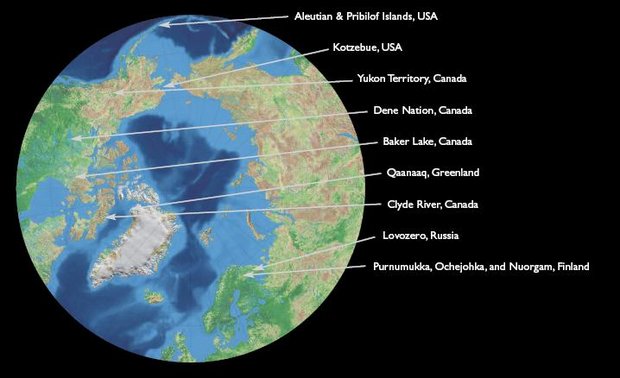Environmental Sociology (main)
Environmental Sociology
Environmental Sociology is a sub-discipline of Sociology focused on researching, analyzing and communicating the complex and wide range of interactions among human societies and the environments that they inhabit. The growing recognition, among all segments of humankind, of the interface of individual and societal well-being and environmental quality helps to define—and elevate—the remit of Environmental Sociology. Significantly, the field has focused on the social dimensions of the ambient, natural environment and the built, human-made environment.
Topical examples of Environmental Sociology include efforts to: understand environmental thought and action as parts of wider social endeavor; clarify how and why people and their cultures perceive environmental opportunities as well as environmental problems; and, investigate, interpret and communicate the nature of drivers of natural and human-induced decline or improvement in environmental condition. Additional foci of the discipline are designed to address the spectrum of issues from environmental degradation and globalization to sustainability and local food systems. Increasingly, these foci aim to disclose the reasons behind inequitable distribution of environmental hazards (for example, investigations of circumstances wherein socially disadvantaged populations often encounter greater exposures to myriad environmental stressors and hazards).
-
 Featured Article
Featured Article  Poverty and National ParksMany poor people live around national parks in developing countries. Does that mean that these parks are contributing to their poverty? Living on the Edge of... More »
Poverty and National ParksMany poor people live around national parks in developing countries. Does that mean that these parks are contributing to their poverty? Living on the Edge of... More »
-
 Featured Article
Featured Article  Climate Change SkepticismThis article, written by Charles W. Schmidt*, appeared first in Environmental Health Perspectives—the peer-reviewed, open access journal of the National Institute of... More »
Climate Change SkepticismThis article, written by Charles W. Schmidt*, appeared first in Environmental Health Perspectives—the peer-reviewed, open access journal of the National Institute of... More »
-
 Featured Article
Featured Article  Green Washing: Do You Know What You Are Buying?Greenwashing is a term used to charactize product advertisements and labels that promise more environmental benefit than is delivered. There is concern about whether impacts of... More »
Green Washing: Do You Know What You Are Buying?Greenwashing is a term used to charactize product advertisements and labels that promise more environmental benefit than is delivered. There is concern about whether impacts of... More »
-
 Featured Article
Featured Article  City Life May Alter Green AttitudesStudy of Chinese citizens says jobs more important than salary when it comes to pro-environmental behavior View a video interview with sustainability scientist Jianguo... More »
City Life May Alter Green AttitudesStudy of Chinese citizens says jobs more important than salary when it comes to pro-environmental behavior View a video interview with sustainability scientist Jianguo... More »
-
 Featured Article
Featured Article  Inclusive Wealth Report 2012The International Human Dimensions Programme on Global Environmental Change (IHDP)* announced at the Rio+20 Summit on June 17, 2012. the launch of the Inclusive Wealth Report 2012... More »
Inclusive Wealth Report 2012The International Human Dimensions Programme on Global Environmental Change (IHDP)* announced at the Rio+20 Summit on June 17, 2012. the launch of the Inclusive Wealth Report 2012... More »
-
 Featured Article
Featured Article  Noise pollution (Environmental Sociology)Noise pollution is unwanted or harmful sound that intrudes upon human or other faunal activity. Noise pollution is almost entirely human generated, whether by machine sources... More »
Noise pollution (Environmental Sociology)Noise pollution is unwanted or harmful sound that intrudes upon human or other faunal activity. Noise pollution is almost entirely human generated, whether by machine sources... More »
 Arctic climate change case studies using indigenous knowledge Last Updated on 2015-07-09 00:12:54 This is Section 3.4 of the Arctic Climate Impact Assessment Lead Authors: Henry Huntington, Shari Fox; Contributing Authors: Fikret Berkes, Igor Krupnik; Case Study Authors are identified on specific case studies; Consulting Authors: Anne Henshaw,Terry Fenge, Scot Nickels, Simon Wilson Indigenous perspectives on the changing Arctic vary widely over time and space, as may be expected given the differences between the histories, cultures, ways of life, social and economic situations, geographical locations, and other characteristics of the many peoples of the region. These perspectives cannot be illustrated by generalizations nor, in the space allotted and with the materials currently available, comprehensively for the entire Arctic. The case studies used in the Arctic Climate Impact Assessment were chosen as illustrations of indigenous perspectives on climate change, and were drawn... More »
Arctic climate change case studies using indigenous knowledge Last Updated on 2015-07-09 00:12:54 This is Section 3.4 of the Arctic Climate Impact Assessment Lead Authors: Henry Huntington, Shari Fox; Contributing Authors: Fikret Berkes, Igor Krupnik; Case Study Authors are identified on specific case studies; Consulting Authors: Anne Henshaw,Terry Fenge, Scot Nickels, Simon Wilson Indigenous perspectives on the changing Arctic vary widely over time and space, as may be expected given the differences between the histories, cultures, ways of life, social and economic situations, geographical locations, and other characteristics of the many peoples of the region. These perspectives cannot be illustrated by generalizations nor, in the space allotted and with the materials currently available, comprehensively for the entire Arctic. The case studies used in the Arctic Climate Impact Assessment were chosen as illustrations of indigenous perspectives on climate change, and were drawn... More »  Climate Change Perceptions Last Updated on 2014-11-20 11:03:33 The Perception Factor: Climate Change Gets Personal This article, written by Catherine M. Cooney, appeared first in Environmental Health Perspectives—the peer-reviewed, open access journal of the National Institute of Environmental Health Sciences. The article is a verbatim version of the original and is not available for edits or additions by Encyclopedia of Earth editors or authors. Companion articles on the same topic that are editable may exist within the Encyclopedia of Earth. Summer 2010 saw a new suite of climate change studies from the National Academy of Sciences (NAS) with the stark conclusion that “Climate change is occurring, is caused largely by human activities, and poses significant risks for—and in many cases is already affecting—a broad range of human and natural systems.”1 The NAS series received a boost from separate research... More »
Climate Change Perceptions Last Updated on 2014-11-20 11:03:33 The Perception Factor: Climate Change Gets Personal This article, written by Catherine M. Cooney, appeared first in Environmental Health Perspectives—the peer-reviewed, open access journal of the National Institute of Environmental Health Sciences. The article is a verbatim version of the original and is not available for edits or additions by Encyclopedia of Earth editors or authors. Companion articles on the same topic that are editable may exist within the Encyclopedia of Earth. Summer 2010 saw a new suite of climate change studies from the National Academy of Sciences (NAS) with the stark conclusion that “Climate change is occurring, is caused largely by human activities, and poses significant risks for—and in many cases is already affecting—a broad range of human and natural systems.”1 The NAS series received a boost from separate research... More »  Inclusive Wealth Report 2012 Last Updated on 2013-10-29 21:21:58 The International Human Dimensions Programme on Global Environmental Change (IHDP)* announced at the Rio+20 Summit on June 17, 2012. the launch of the Inclusive Wealth Report 2012 (IWR 2012). The report measures the wealth of nations. Download PDF | Read more about the report The report presents a new economic index, which looks beyond the traditional short term economic and development yardsticks of gross domestic product (GDP) and the Human Development Index (HDI). The Inclusive Wealth Index (IWI) assesses changes in a country’s productive base, including produced, human, and natural capital over time. By taking a more holistic approach, the IWI shows governments the true state of their nation’s wealth and the sustainability of its growth. Twenty countries were assessed in the IWR 2012 over a period of 19 years (1990-2008). Together they represent more than half of... More »
Inclusive Wealth Report 2012 Last Updated on 2013-10-29 21:21:58 The International Human Dimensions Programme on Global Environmental Change (IHDP)* announced at the Rio+20 Summit on June 17, 2012. the launch of the Inclusive Wealth Report 2012 (IWR 2012). The report measures the wealth of nations. Download PDF | Read more about the report The report presents a new economic index, which looks beyond the traditional short term economic and development yardsticks of gross domestic product (GDP) and the Human Development Index (HDI). The Inclusive Wealth Index (IWI) assesses changes in a country’s productive base, including produced, human, and natural capital over time. By taking a more holistic approach, the IWI shows governments the true state of their nation’s wealth and the sustainability of its growth. Twenty countries were assessed in the IWR 2012 over a period of 19 years (1990-2008). Together they represent more than half of... More »  Gibraltar (Environmental Sociology) Last Updated on 2013-10-13 00:03:00 Gibraltar is a small overseas territory of the United Kingdom with slightly under 30,000 people strategically located on Strait of Gibraltar that links the North Atlantic Ocean and Mediterranean Sea, adjoining Spain. Strategically important, Gibraltar was reluctantly ceded to Great Britain by Spain in the 1713 Treaty of Utrecht. The British garrison was formally declared a colony in 1830. In a referendum held in 1967, Gibraltarians voted overwhelmingly to remain a British dependency. The subsequent granting of autonomy in 1969 by the UK led to Spain closing the border and severing all communication links. A series of talks were held by the United Kingdom and Spain between 1997 and 2002 on establishing temporary joint sovereignty over Gibraltar. In response to these talks, the Gibraltar Government called a referendum in late 2002 in which... More »
Gibraltar (Environmental Sociology) Last Updated on 2013-10-13 00:03:00 Gibraltar is a small overseas territory of the United Kingdom with slightly under 30,000 people strategically located on Strait of Gibraltar that links the North Atlantic Ocean and Mediterranean Sea, adjoining Spain. Strategically important, Gibraltar was reluctantly ceded to Great Britain by Spain in the 1713 Treaty of Utrecht. The British garrison was formally declared a colony in 1830. In a referendum held in 1967, Gibraltarians voted overwhelmingly to remain a British dependency. The subsequent granting of autonomy in 1969 by the UK led to Spain closing the border and severing all communication links. A series of talks were held by the United Kingdom and Spain between 1997 and 2002 on establishing temporary joint sovereignty over Gibraltar. In response to these talks, the Gibraltar Government called a referendum in late 2002 in which... More »  Property rights and ecological-social interactions Last Updated on 2013-08-28 20:28:34 Humans interact with their environment through systems of property rights and governance (that are embedded in social, political, cultural, and economic context), and thereby affect both the quantity and quality of environmental resources. While national and international economic policies have often ignored the environment, institutions could play a key role in reconciling economic development and the maintenance of environmental carrying capacity and resilience[1]. Ecology and Society[2] and Environment and Development Economics[3] describes recent research on resilience in social-ecological systems. Folke and Gunderson identify several papers which explain how better ecological-social research can help to address global environmental issues[4]. This article explains how the functioning of property rights regimes in relation to human use of the environment, is critical to the design... More »
Property rights and ecological-social interactions Last Updated on 2013-08-28 20:28:34 Humans interact with their environment through systems of property rights and governance (that are embedded in social, political, cultural, and economic context), and thereby affect both the quantity and quality of environmental resources. While national and international economic policies have often ignored the environment, institutions could play a key role in reconciling economic development and the maintenance of environmental carrying capacity and resilience[1]. Ecology and Society[2] and Environment and Development Economics[3] describes recent research on resilience in social-ecological systems. Folke and Gunderson identify several papers which explain how better ecological-social research can help to address global environmental issues[4]. This article explains how the functioning of property rights regimes in relation to human use of the environment, is critical to the design... More »